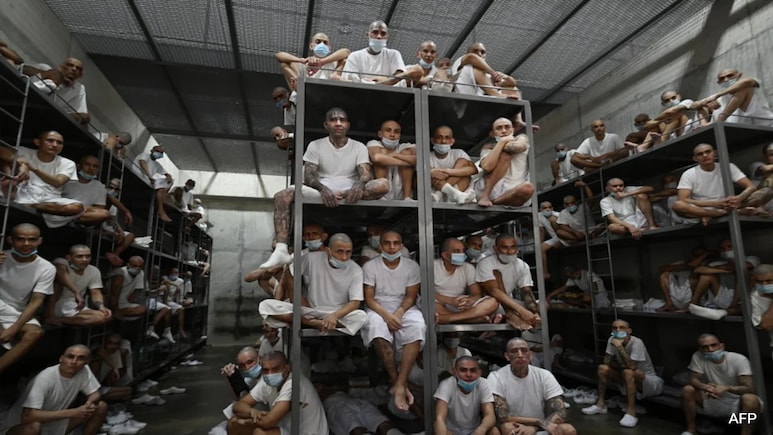
San Salvador:
El Salvador has offered to incarcerate American convicts and illegal migrants of any nationality deported from the United States at Latin America’s largest maximum security prison. But, Salvadoran President Nayib Bukele’s proposal comes with a price tag and legal challenges –ones that US President Donald Trump’s administration is considering to tackle.
After meeting US Secretary of State Marco Rubio on Monday, Bukele offered to lock up convicts “of any nationality”, sent by the United States, at the facility known as CECOT, where prisoners live crammed in windowless cells, sleeping on metal beds with no mattress, forbidden from having visitors and kept under watch 24 hours a day.
Iron-fisted Bukele, who enjoys sky-high approval ratings for his sweeping crackdown on violent gangs, said that El Salvador wanted to give the United States a chance to “outsource part of its prison system.”
Trump Considering El Salvador’s Proposal
Trump on Tuesday backed El Salvador’s offer despite clear legal problems with such an outsourcing under American law. “If we had the legal right to do it, I would do it in a heartbeat,” he told reporters in the Oval Office.
“It’s no different than our prison system, except it would be a lot less expensive, and it would be a great deterrent,” Trump added.
He said he would negotiate payment, which would decrease costs for the United States but help fund El Salvador’s own mass incarceration.
Trump said that shipping criminals to El Salvador would be “a very small fee compared to what we pay to private prisons.”
“Frankly, they could keep them, because these people are never going to be any good,” Trump said.
Trump’s top envoy Rubio, who met Bukele on Monday, also said the Trump administration would review the proposal but acknowledged legal issues. “We’ll have to study it on our end. There are obviously legalities involved,” Rubio told reporters a day afterwards in Costa Rica, where he headed after El Salvador.
“We have a constitution, we have all sorts of things, but it’s a very generous offer,” Rubio said. He welcomed the offer saying, “No one’s ever made an offer like that.”
El Salvador’s Offer
Elaborating on Bukele’s offer, Rubia said apart from Salvadoran deportees who illegally entered the US, El Salvador will also “accept for deportation any illegal alien in the United States who is a criminal from any nationality, be they MS-13 or Tren de Aragua and house them in his jails”– referring to two notorious transnational gangs with members from El Salvador and Venezuela.
In addition, Bukele “has offered to house in his jails dangerous American criminals in custody in our country, including those of US citizenship and legal residents,” Rubio said.
Legal Challenges
The US Constitution forbids “cruel and unusual punishment” and promises due process. There is little precedent in modern times for a democratic country to send its own citizens to foreign prisons. Moreover, US citizens who were born in America enjoy legal protection from deportation.
However, there are some cases where naturalised citizens – those who were not born in the US and who obtained US citizenship after birth through a legal process – can have their citizenship revoked. This generally happens in the case where the person in question used fraud to obtain citizenship in the first place.
With questions around the legality of such a move, any effort by the Trump administration to deport incarcerated US nationals to another country is likely to face significant legal pushback.
About CECOT
El Salvador’s Terrorism Confinement Center, commonly referred to as CECOT, is the country’s largest prison which opened in 2023, with a maximum capacity of 40,000 inmates. It is made up of eight sprawling pavilions. Its cells hold 65 to 70 prisoners each, who do not receive visits, according to a report by the Associated Press.
Prisoners in boxer shorts are reportedly marched into prison yards and made to sit nearly atop each other. They are packed into cells without enough bunks for everyone. Moreover, there are no programs preparing these prisoners to return to society after their sentences– no workshops or educational programs– as they are never allowed outside.
Bukele’s iron-fisted rule has been greatly credited for reducing gang violence in the Central American country since launching a sweeping crackdown in 2022 that has seen the imprisonment of over 80,000 people. But while the crime rate in what was once one of the world’s most violent countries has fallen, the treatment of those imprisoned has triggered outrage among human rights organizations who call El Salvador’s prisons inhumane.
Trump’s Crackdown on Illegal Immigration
Meanwhile, as part of his administration’s crackdown on illegal immigration, Trump has already announced that the United States will hold migrants at the notorious Guantanamo military detention facility in Cuba that was opened in January 2002. But that prison is built on a US naval base leased from Havana under a treaty dating back to 1903.
The detention facility was set up after the 11 September 2001 attacks to deal with prisoners who were termed “enemy combatants” and denied many US legal rights. Democratic presidents Barack Obama and Joe Biden both sought to close the facility, but Congress has opposed efforts to shut Guantanamo and it remains open to this day.
Ahead of US Secretary of State Marco Rubio’s visit this week, Washington had touted El Salvador as a possible “safe third country” for expelled migrants whose countries do not accept US deportation flights.
On Tuesday, the United States began flying detained migrants to the notorious military base in Cuba, where hundreds of terrorism suspects were held for years after the 9/11 attacks, many without formal charges.
This post was originally published on this site be sure to check out more of their content.








